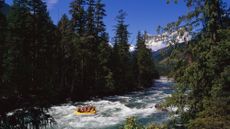How HBO's Divorce narrowly escapes terminal bleakness
On the twinkle of intimacy that saves the show

I still don't know why I like Divorce — the HBO series, created by Sharon Horgan, that wraps up its first season this week — as much as I do. A dark comedy focused on the painful divorce proceedings of a well-heeled Hudson Valley couple, Frances and Robert Dufresne (Sarah Jessica Parker and Thomas Hayden Church), the show has all the makings of a stone cold bummer. In many ways, it is — and I am not the kind of person who, when searching for a new show to watch at the end of a long day, says "You know what? I'd really like to feel devastated." Divorce is at times a devastating show, full of the kinds of recriminations and self-deceit that are all too familiar to us from our real lives — but it's also a funny one, and, in perhaps a more sustaining way, it is kind. Its kindness, as a narrative, comes from its willingness to look unflinchingly at its characters no matter how selfish and delusional they prove themselves to be, to continually give them chances to redeem themselves, and to document their near-misses as they strive to understand some emotional reality beyond their own.
Divorce takes two lead actors known for their broad, comedic performances, and subdues them. It's hard to watch Sarah Jessica Parker in anything without seeing her as an older version of Carrie Bradshaw, the self-obsessed but undeniably winsome heroine of Sex and the City, a show Parker carried with effervescent wit and energy. In one episode of Sex and the City, Carrie Bradshaw decides — after a breakup that leads her to compare herself to Katie, Barbra Streisand's spitfire heroine in The Way We Were — that "the world is made up of two types of women: the simple girls and the Katie girls. I'm a Katie girl!"
Frances, Sarah Jessica Parker's character in Divorce, is decidedly not a Katie girl. But she's not a simple girl, either: She's a woman who seems to have ignored her instincts, so completely and for so long a time, that she can voice a desire only at the moment that it overwhelms her. For Frances, and for nearly every other character in Divorce, emotion and equilibrium are mutually exclusive.
Subscribe to The Week
Escape your echo chamber. Get the facts behind the news, plus analysis from multiple perspectives.

Sign up for The Week's Free Newsletters
From our morning news briefing to a weekly Good News Newsletter, get the best of The Week delivered directly to your inbox.
From our morning news briefing to a weekly Good News Newsletter, get the best of The Week delivered directly to your inbox.
None of the characters on Divorce quite know how to talk to each other: Frances and her friends Diane (Molly Shannon) and Dallas (Talia Balsam) don't have conversations so much as overlapping monologues; in the days after Frances asks him for a divorce, Robert can't find anyone to talk to, and ends up sitting by the bedside of a friend who is in an induced coma, and telling his troubles to a warm body — until that body regains consciousness, and tells him to shut up.
The warm body, otherwise known as Nick (Tracy Letts), is Diane's husband, and the heart attack he suffered in the pilot episode — when Diane, whipped into a murderous rage, pulled a gun on him — provides the catalyst for Robert and Frances' divorce. Frances is horrified that the hatred she sees between Nick and Diane is hatred she has felt for Robert, but long repressed. It is only once they begin to separate that Robert and Frances become capable of seeing each other — and maybe even of communicating.
"I never saw one sign of it," Robert tells Frances, of an affair Frances only told him about after announcing her intentions to divorce him. "I never saw anything in your eyes. I was never suspicious of you."
"And I was never suspicious of you," Frances says, of the massive debt that was Robert's secret from her.
If there's one thing that keeps Divorce from being terminally bleak, it's not its wit or its compelling performances or its understatedly beautiful production. It's the fact that, as the series progresses and Robert and Frances continue toward divorce (though divorce itself may be as anathema to Divorce as Walter White's death from cancer was to Breaking Bad), the two characters grow more and more willing to understand each other, and less and less able to conceal the depth of their unhappiness from themselves.
Divorce provides a fascinating little companion piece to this fall's The Girl on the Train, a movie that also depicted the hidden troubles of rich white Hudson Valley residents — another group, basically, of unfulfilled suburban women in beautiful, earth-toned sweaters. The Girl on the Train identified the trouble-lurking-beneath-the-affluent-surface as one Very Bad Man. Divorce suggests that the misery of the privileged might just come from a sheer lack of intimacy; from the hunger that results when friends and lovers and romantic partners not only stop trying to communicate with each other, but lose the ability to do so.
But the last season of Divorce has also shown us a group of people who can be forced to see each other a little more clearly when faced with a crisis, a moment of rupture, an experience that rocks their sedate little world. To that end, it's a beautifully constructed show, as tightly imagined and grimly compelling as a series of linked short stories. But in the end, it also creates, in the viewer, a hunger for more stories that depict the emotionally open: Characters for whom intimacy and connection are everyday realities, accessible even beyond the timeline of a crisis.
Create an account with the same email registered to your subscription to unlock access.
Sign up for Today's Best Articles in your inbox
A free daily email with the biggest news stories of the day – and the best features from TheWeek.com
Sarah Marshall's writings on gender, crime, and scandal have appeared in The Believer, The New Republic, Fusion, and The Best American Nonrequired Reading 2015, among other publications. She tweets @remember_Sarah.
-
 Labour's Brexit conundrum
Labour's Brexit conundrumThe Explainer Keir Starmer backs 'twin track' strategy – build closer security ties with EU while ruling out single market, customs union and free movement
By The Week UK Published
-
 6 scenic white water rafting destinations to get your heart racing
6 scenic white water rafting destinations to get your heart racingThe Week Recommends Have a rip-roaring time on the water
By Catherine Garcia, The Week US Published
-
 Dangerous substances in Lunchables are raising concerns over children's health
Dangerous substances in Lunchables are raising concerns over children's healthIn the Spotlight High levels of lead and sodium were recently found in the snack packages
By Justin Klawans, The Week US Published
-
 Walter Isaacson's 'Elon Musk' can 'scarcely contain its subject'
Walter Isaacson's 'Elon Musk' can 'scarcely contain its subject'The latest biography on the elusive tech mogul is causing a stir among critics
By Theara Coleman Published
-
 Welcome to the new TheWeek.com!
Welcome to the new TheWeek.com!The Explainer Please allow us to reintroduce ourselves
By Jeva Lange Published
-
 The Oscars finale was a heartless disaster
The Oscars finale was a heartless disasterThe Explainer A calculated attempt at emotional manipulation goes very wrong
By Jeva Lange Last updated
-
 Most awkward awards show ever?
Most awkward awards show ever?The Explainer The best, worst, and most shocking moments from a chaotic Golden Globes
By Brendan Morrow Published
-
 The possible silver lining to the Warner Bros. deal
The possible silver lining to the Warner Bros. dealThe Explainer Could what's terrible for theaters be good for creators?
By Jeva Lange Last updated
-
 Jeffrey Wright is the new 'narrator voice'
Jeffrey Wright is the new 'narrator voice'The Explainer Move over, Sam Elliott and Morgan Freeman
By Jeva Lange Published
-
 This week's literary events are the biggest award shows of 2020
This week's literary events are the biggest award shows of 2020feature So long, Oscar. Hello, Booker.
By Jeva Lange Published
-
 What She Dies Tomorrow can teach us about our unshakable obsession with mortality
What She Dies Tomorrow can teach us about our unshakable obsession with mortalityThe Explainer This film isn't about the pandemic. But it can help viewers confront their fears about death.
By Jeva Lange Published